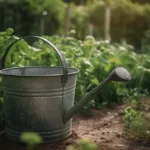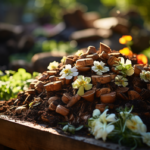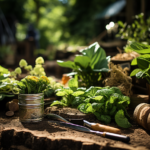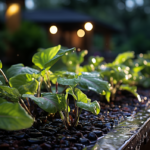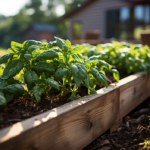Table of Contents
Discover the Best Natural Pest Repellent Plants to Add to Your Garden for a Safe and Healthy Harvest
Hey there, fellow gardeners! Are you tired of pests invading your garden and ruining your crops? Don’t worry, you’re not alone! In this article, I’ll share with you the top 5 plants that effectively repel pests and keep your garden healthy and flourishing. Say goodbye to harmful chemical pesticides that not only harm the pests but also your plants, and try these natural remedies instead. These plants not only protect your garden but also add a fresh aroma and flavor to your dishes. So, let’s dig in and discover the best natural pest repellent plants to add to your kitchen garden!
Mint
Mint is one of the most commonly grown herbs in a garden, but did you know it can keep pests at bay?
Repelling Effect
The strong scent of mint can be overpowering for several insects including ants, flies, and mosquitoes, making it an excellent natural pest repellent. Growing mint around your tomato, cucumber, and cabbage plants will keep the pests away. You can also make a natural pest repellent spray by mixing mint leaves with water and spraying it on the affected plants.
Beneficial Insects
However, not all insects are harmful to your garden. Some insects, such as ladybugs, bees, and butterflies, help in pollination and keeping the garden healthy. Mint’s aroma attracts and welcomes beneficial insects.
Culinary Use
Aside from deterring pests, mint is also a staple in many culinary dishes. Infuse mint leaves into water and add a slice of lemon to make a refreshing drink. Mint pairs well with many savory and sweet dishes such as lamb, fish, salads, ice cream, and chocolate desserts.
Growing Tips
When growing mint, it is essential to keep them contained in a pot or planter, as it can be invasive and take over your garden. Plant mint in a spot that receives partial sunlight and water regularly to keep the soil moist. Mint will grow back each season, and you can propagate by using the stem cuttings or dividing the clumps every three to four years.
Common Types
There are several varieties of mint, such as spearmint, peppermint, and chocolate mint. Each variety has a slightly different flavor and scent, so you can experiment and find the one that suit your taste.
Mint is not only an excellent natural pest repellent, but it’s also a flavorful addition to any garden and kitchen. With its versatility and ease of maintenance, there’s no reason not to try growing mint in your kitchen garden.
Basil
Basil is a popular herb admired for its delicious taste and fragrant aroma, and it also happens to be an effective pest repellent. Planting basil in your kitchen garden will not only add an incredible taste to your dishes but also protect your crops from unwanted pests. Here are some interesting facts about basil and how it can benefit your garden:
- Pests deterred by basil: Basil contains essential oils with strong scents that repel various pests, including flies, mosquitoes, and aphids. Planting basil alongside your tomatoes, peppers, and eggplant can help repel their respective aphids.
- Easy to grow: Basil is an easy-to-grow herb that thrives in warm and sunny conditions. It can be grown either in pots or directly in the ground and requires well-draining soil.
- Companion planting: Basil is a great companion plant for many common garden vegetables, including tomatoes, peppers, and eggplants. Not only does it repel pests, but it can also enhance the flavor and growth of its companion plants.
- Multiple varieties: Basil comes in various varieties, including sweet, lemon, and Thai. Sweet basil is the most common variety used in cooking, while lemon basil adds citrus flavor and is useful in teas and desserts.
- Growing and harvesting tips: For best growth, pinch back the plant’s tip when it reaches 6-8 inches tall. Basil leaves are ready for harvesting once the plant has developed at least two pairs of true leaves. To encourage bushy growth, pinch off the main stem’s tip, and leave the side shoots.
Basil is an incredibly versatile herb that not only enhances the taste of your dishes but also provides a natural means of pest control. Its ease of growth and compatibility with other garden vegetables make it the perfect addition to any kitchen garden. By planting basil alongside other veggies, gardeners can achieve a thriving, healthy garden while avoiding harmful pesticides. Give basil a try in your kitchen garden – your taste buds and crops will thank you!
Marigold
If you’re looking for a beautiful flower that doubles up as a pest repellent, then marigolds are an excellent choice to add to your kitchen garden. These golden, orange, or yellow flowers contain a natural compound called pyrethrum, which repels pests such as mosquitoes, aphids, whiteflies, and nematodes.
Why Plant Marigold in Your Garden
- Marigold plants are incredibly versatile and grow well in containers, raised beds, or ground soil
- They have a strong aroma that repels a wide range of garden pests
- They flower all summer long and make a beautiful addition to any garden
- They are low maintenance plants, requiring only regular watering and fertilization
How to Plant Marigold in Your Garden
- Plant marigolds in a sunny area with well-drained soil
- Sow the seeds directly into the ground or starter pots indoors, 4 to 6 weeks before the last frost date
- Water consistently, as marigolds require 1 to 2 inches of water per week, but avoid overwatering or waterlogging
- Apply a balanced fertilizer to encourage healthy growth
Types of Marigold
- African Marigold (Tagetes erecta) has large flower heads and strong aroma, making it an effective pest repellent
- French Marigold (Tagetes patula) is a compact plant that produces multicolored flowers and has a strong scent that repels insects
- Signet Marigold (Tagetes tenuifolia) has small flowers and a delicate aroma, making it ideal for use in salads and other dishes as a flavorful garnish
Extra Tips
- Deadhead regularly to encourage new blooms and prevent the plant from going to seed
- Cut back the spent flowers and trim the plant to promote bushier growth
- Companion plant marigolds with tomatoes, cucumbers, and peppers to repel aphids and other pests.
Marigolds are not only attractive ornamental plants but also a natural and effective way to keep pests at bay in your kitchen garden. They are easy to grow and require minimal care, making them a perfect choice for beginners or anyone looking to try a new addition to their garden. So why not give them a try and watch your garden flourish!
Chives
Chives are a popular herb known for their onion-like flavor and aroma. However, not many of us know that chives are effective in repelling harmful pests from our kitchen garden. Here’s all you need to know about chives as natural pest repellents!
How Chives Repel Pests
Chives contain sulfur compounds that make them unattractive to pests like aphids, slugs, and Japanese beetles. The strong smell of chives also confuses pests and deters them from infesting your plants. As a result, your kitchen garden remains pest-free and healthy.
How to Plant Chives
Chives are easy to grow and maintain, making them a favorite among gardeners. Here are some essential tips to follow while planting chives:
- Chive plants grow best in partial sunlight and moist soil conditions.
- Plant your chives 1-2 inches apart in well-draining soil.
- Water your chives frequently (1-2 inches per week).
- Fertilize your chives with organic compost or a balanced fertilizer once every two weeks.
- Trim your chive plants regularly to prevent them from flowering and encourage new growth.
Companion Plants for Chives
Chives can be planted alongside other plants to improve their growth and repel pests. Some excellent companion plants for chives include:
- Tomatoes: Chives repel aphids, which commonly infest tomato plants.
- Carrots: Chives deter the carrot rust fly, which can damage carrot crops.
- Basil: Chives and basil together make an excellent pest repellent combination.
Using Chives for Pest Control
Here are some tips on how to use chives as a natural pest repellent:
- Plant chives in between other plants to keep pests away.
- Crush some fresh chives and sprinkle them around the base of your plants to repel slugs and other pests.
- Make chive spray by boiling a handful of chopped chives in water for 10-15 minutes. Strain the mixture, add some liquid soap, and spray it on your plants to repel pests.
Chives are an excellent addition to your kitchen garden for both culinary and pest control purposes. Start planting them today and enjoy a naturally pest-free kitchen garden!
Rosemary
Rosemary is not only a versatile herb used in cooking, but it is also an excellent addition to your kitchen garden as a pest repellent. Its strong aroma and flavor make it a perfect option for keeping a range of insects and pests at bay. Here are some essential aspects of growing and using rosemary as a natural pest repellent:
Growing Rosemary
- Rosemary thrives in well-drained soil with at least six hours of sunlight daily.
- It can be grown year-round in warmer climates or in containers indoors for colder regions.
- Regular pruning can help to keep the plant healthy and encourage new growth.
Rosemary as a Pest Repellent
- Rosemary can deter a range of pests, including mosquitoes, flies, and carrot flies.
- You can hang sprigs of dried rosemary or fresh ones in your kitchen to keep pests away.
- You can also mix rosemary oil with water and spray the solution on your plants to repel insects.
Using Rosemary
- Rosemary’s strong aroma and flavor make it a delicious addition to a variety of dishes like roasted meats, soups, and stews.
- You can harvest rosemary leaves anytime they’re mature, and it’s best to do so before flowering.
- Fresh rosemary can be stored in the fridge for a couple of weeks, whereas dried rosemary can last for a year in an airtight container.
Growing rosemary in your kitchen garden can be incredibly beneficial as a natural insecticide and flavorful herb. With its many uses and benefits, it’s a must-have plant for any gardener. Try it today, and you’ll be amazed at how it transforms your garden and culinary skills!
Conclusion
There you have it, the top five kitchen garden plants that can help you keep pests away while providing great flavors and aromas to your dishes. These plants are not only effective at pest control but also easy to grow and maintain. By incorporating these plants to your kitchen garden, you’ll have a safe, healthy, and organic harvest. Moreover, you’ll be doing your bit towards promoting a greener environment by avoiding chemical pesticides. So, what are you waiting for? Go ahead and add these amazing natural remedies to your garden and enjoy an abundant harvest free of pests!


